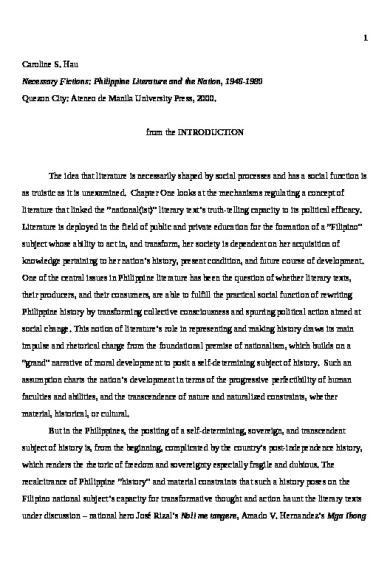Necessary Fictions: Philippine Literature and the Nation, 1946-1980 DOCX

| Title | Necessary Fictions: Philippine Literature and the Nation, 1946-1980 |
|---|---|
| Author | Caroline Hau |
| Pages | 5 |
| File Size | 23 KB |
| File Type | DOCX |
| Total Downloads | 113 |
| Total Views | 206 |
Summary
1 Caroline S. Hau Necessary Fictions: Philippine Literature and the Nation, 1946-1980 Quezon City: Ateneo de Manila University Press, 2000. from the INTRODUCTION The idea that literature is necessarily shaped by social processes and has a social function is as truistic as it is unexamined. Chapter O...
Description
Caroline S. Hau Necessary Fictions: Philippine Literature and the Nation, 1946-1980 Quezon City: Ateneo de Manila University Press, 2000. from the INTRODUCTION The idea that literature is necessarily shaped by social processes and has a social function is as truistic as it is unexamined. Chapter One looks at the mechanisms regulating a concept of literature that linked the "national(ist)" literary text's truth-telling capacity to its political efficacy. Literature is deployed in the field of public and private education for the formation of a "Filipino" subject whose ability to act in, and transform, her society is dependent on her acquisition of knowledge pertaining to her nation's history, present condition, and future course of development. One of the central issues in Philippine literature has been the question of whether literary texts, their producers, and their consumers, are able to fulfill the practical social function of rewriting Philippine history by transforming collective consciousness and spurring political action aimed at social change. This notion of literature's role in representing and making history draws its main impulse and rhetorical charge from the foundational premise of nationalism, which builds on a "grand" narrative of moral development to posit a self-determining subject of history. Such an assumption charts the nation's development in terms of the progressive perfectibility of human faculties and abilities, and the transcendence of nature and naturalized constraints, whether material, historical, or cultural. But in the Philippines, the positing of a self-determining, sovereign, and transcendent subject of history is, from the beginning, complicated by the country's post-independence history, which renders the rhetoric of freedom and sovereignty especially fragile and dubious. The recalcitrance of Philippine "history" and material constraints that such a history poses on the Filipino national subject's capacity for transformative thought and action haunt the literary texts under discussion – national hero José Rizal's Noli me tangere, Amado V. Hernandez's Mga Ibong 1...
Similar Free PDFs

Philippine Literature Stories
- 22 Pages

The Fall of Rome Facts and Fictions
- 12 Pages

Definition of the Nation
- 9 Pages

The Necessary Art of Persuasion
- 15 Pages
Popular Institutions
- Tinajero National High School - Annex
- Politeknik Caltex Riau
- Yokohama City University
- SGT University
- University of Al-Qadisiyah
- Divine Word College of Vigan
- Techniek College Rotterdam
- Universidade de Santiago
- Universiti Teknologi MARA Cawangan Johor Kampus Pasir Gudang
- Poltekkes Kemenkes Yogyakarta
- Baguio City National High School
- Colegio san marcos
- preparatoria uno
- Centro de Bachillerato Tecnológico Industrial y de Servicios No. 107
- Dalian Maritime University
- Quang Trung Secondary School
- Colegio Tecnológico en Informática
- Corporación Regional de Educación Superior
- Grupo CEDVA
- Dar Al Uloom University
- Centro de Estudios Preuniversitarios de la Universidad Nacional de Ingeniería
- 上智大学
- Aakash International School, Nuna Majara
- San Felipe Neri Catholic School
- Kang Chiao International School - New Taipei City
- Misamis Occidental National High School
- Institución Educativa Escuela Normal Juan Ladrilleros
- Kolehiyo ng Pantukan
- Batanes State College
- Instituto Continental
- Sekolah Menengah Kejuruan Kesehatan Kaltara (Tarakan)
- Colegio de La Inmaculada Concepcion - Cebu











